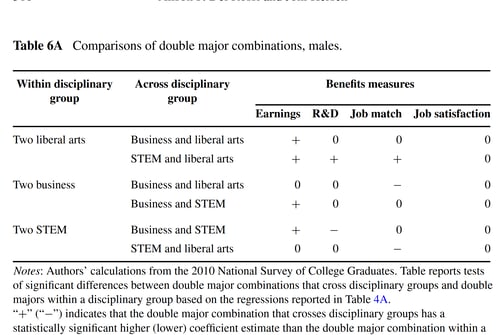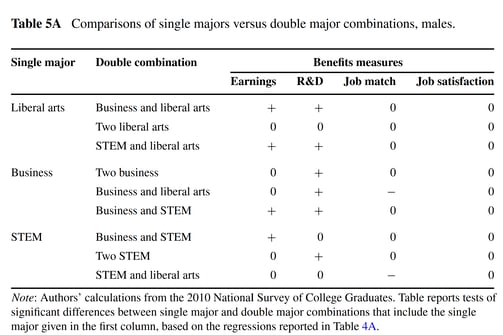Rationalizing a Dual Degree
Blog post description.
3/3/20255 min read


In May 2025, I will (or have) graduate(d) with a dual degree [1] in Computer Engineering and Political Science. Over the years, I've been asked or had to otherwise justify [2] why I decided to major in both STEM and Liberal Arts, and I hope this post sufficiently answers that question.
TL;DR: A dual degree only "costs" me an extra semester.
Before I stand on my soapbox and philosophize about diversification of skills, the brief answer for why I took a dual degree is that because of Purdue's Degree+ program and my plan of study, I would only need one more semester to complete the dual degree requirements. Through Degree+, I would only have to take 33 credits, and because I would have already had to take some liberal arts classes to fulfill the University Core Curriculum for my CompE degree, I would only have to take ~24 credits or 8 classes. Split over a 4-year degree, this would amount to an extra class a semester, which is very doable.
If I had chosen not to take the dual degree, I could have either graduated with a single CompE degree in 3.5 years, or with a Masters and Bachelors degree in CompE in 4.5 years through the Purdue ECE 4+1 program. In my mind, graduating a semester early would save me a semesters worth of tuition and allow me to earn ~5 more months of salary, but I was not prepared to leave college that soon. I was also privileged to not need to minimize college costs due to a scholarship, which provided for up to 4 years of education. As for why I chose not to take a Masters in CompE, I believed that while taking a Masters would increase my expected salary, I did not want to choose my specialization into a sub-field just yet [3].
Hence, a simple answer to the question is that I had the financial means to take a full 4 years for my Bachelors, did not want to specialize by taking a Master's Degree just yet, had an interest in Political Science, and was able to do so within my timeframe due to the reduced requirements of Degree+ [4].
Why Political Science?
Although I'm a CompE major, I like to use the example of bridges when explaining the connection between engineering and political science. How do we know if a bridge (or product) will be used? Who will use it? How will it affect people? These are the questions that I've always been interested in answering. In other words, I'm not only interested in how to build a bridge, but why. In more practical terms, my dual degrees have allowed me to better understand:
How governments regulate technology (e.g., data privacy, social media, AI)
How technology affects society
Another common explanation for how a liberal arts degree enhances a STEM degree is that it allows engineers to better communicate with non-technical staff, and to better conduct market research and write technical documentation. I dislike this explanation because I believe an adequate STEM education should sufficiently equip engineers with these skills.
These two explanations are fairly vanilla and 'boring', however. From here on out, I'll be on my soapbox, so feel free to stop reading if a technical explanation is all you want.
I first had an inkling that I wanted to pursue a dual degree at Singapore Polytechnic (SP), where I was pursuing a diploma in Electrical and Electronic Engineering [5]. As part of my SP scholarship requirements, I participated in the SP Outstanding Talent program which allowed me to take the SP equivalent of liberal arts classes. During SP, I also co-founded a startup, MakerFoundry LLP, which was later awarded government grants for education. Without going to into depth about how these experiences changed me, I wanted to learn more about how technology affects society and vice versa in college.
A study-based approach to dual degrees.
Does taking a dual degree make sense? According to research, it actually depends.
Del Rossi and Hersch (2016) find that among double major graduates, the highest earning premium occur when both majors belong to high-income fields such as STEM and business or two STEM majors. In contrast, combining a high-income major (e.g., Computer Engineering) with a low-income major (e.g., Political Science) does not provide a significant financial advantage over a single high-income major. Uddin and Tout (2020) further support this finding, noting that interdisciplinary double majors tend to earn less than those who pursue two high-income fields. Their study highlights that a dual degree can sometimes reduce earnings potential, particularly when one major is in a lower-income discipline.


Table comparing the benefits of double major combinations (Uddin and Tout, 2020). A STEM and Liberal Arts double major combination has a significantly decrease in job matching compared to two STEM degrees, but otherwise have the same earnings, R&D potential, and job satisfaction.


Table comparing the benefits of double major combinations (Uddin and Tout, 2020) to single majors. A STEM and Liberal Arts double major combination has fewer benefits compared to a single STEM major.
Footnotes
[1] Although similar in name, a dual-degree program includes degrees from different colleges (e.g., a degree from both the College of Engineering and the College of Liberal Arts in my case), whereas a double degree program is one where you obtain both degrees within the same college.
[2] As a disclaimer, I believe that asking me this question of why is completely justified and would state that most people who have asked me about it have done so in good faith. Apart from curiosity, I believe that a portion of the curiosity stems from an economic angle as well. Instead of taking a Bachelor's of Arts in Liberal Arts, or even a second degree at all, I could have either: (a) graduated a semester or two early, or (b) graduated with a Master's Degree.
[3] I was concerned that taking a Masters in ECE with a likely specialization in Software Engineering/AI/Computer Systems would mean that I could only apply for those jobs when I graduated.
[4] Lest I incur the wrath of my academic advisor for besmirching the reputation of the College of Liberal Arts, the Degree+ program only requires that a student complete the Major requirements (e.g., 33 credits of POL classes), without completing the College requirements such as a foreign language or liberal arts classes outside your major for the Diversity requirement.
[5] For my non-Singaporean readers, here is a brief explanation of the Singaporean education system. Students attend Polytechnics for 3 years between the ages of 17 to 19 (approx.) where they will graduate with a Diploma (the likely equivalent is an Associate's Degree). Polytechnics are often compared to Junior Colleges, where students graduate with a GCSE 'A' level certificate.
References
Del Rossi, A. F., & Hersch, J. (2016). The Private and Social Benefits of Double Majors. Journal of Benefit-Cost Analysis, 7(2), 292–325. doi:10.1017/bca.2016.14
Hanks, A. S., Jiang, S., Qian, X., Wang, B., & Weinberg, B. A. (2024). Do double majors face less risk? An analysis of human capital diversification (NBER Working Paper No. 32095). National Bureau of Economic Research. https://www.nber.org/papers/w32095
Uddin, M. J., & Tout, R. (2020). The impact of dual majors on income based on the American Community Survey. Asia-Pacific Journal of Educational Management Research, 5(1), 21–36. https://doi.org/10.21742/ajemr.2020.5.1.03